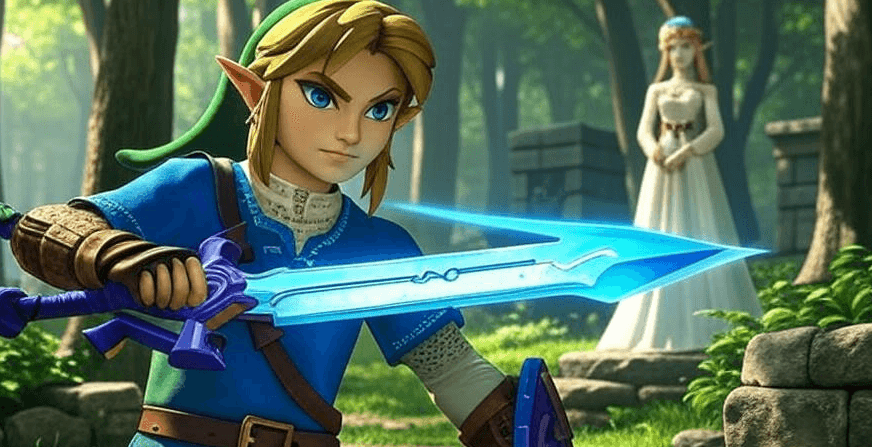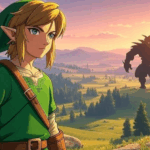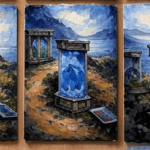The Legend of Zelda: Skyward Sword, often referred to as Zelda SS, is a cornerstone of the iconic Zelda franchise. Originally launched in 2011 for the Nintendo Wii, this action-adventure game marked the 25th anniversary of the series and introduced players to the origins of the Master Sword. Fast forward to 2021, and Zelda SS was revitalised with Skyward Sword HD for the Nintendo Switch, bringing quality-of-life improvements and modern polish to a classic. As a long-time Zelda fan, I’ve delved into both versions to offer a personal yet comprehensive review of Zelda SS, exploring its strengths, flaws, and why it remains a must-play for fans despite its divisive reputation.
- Developers: Nintendo, Nintendo Entertainment Analysis & Development, Monolith Soft, Tantalus Media
- Awards: VGX Award for Best Wii Game, VGX Award for Best Motion Game
- Nominations: BAFTA Games Award for Best Game · See more
- Composer: Hajime Wakai
- Genres: Puzzle Video Game, Action-adventure game, Fighting game, Platform game
Zelda SS stands out for its captivating narrative, which many consider the strongest in the franchise. The story follows Link, a young hero with genuine emotional depth, as he embarks on a quest to save his childhood friend Zelda and prevent the world’s destruction. Unlike the stoic Link in games like Breath of the Wild, Zelda SS portrays him with human emotions, making his journey deeply personal. The pre-established bond between Link and Zelda adds weight to his heroism, transforming the adventure into a heartfelt mission to save a loved one. The vibrant cast of characters, from the loyal yet occasionally intrusive Fi to quirky NPCs, injects personality into every interaction, making the world of Skyloft and beyond feel alive.

Visually, Zelda SS is a treat. The original Wii version’s painterly art style, resembling a moving watercolour, holds up remarkably well. The Switch remaster enhances this with 1080p resolution and a silky 60fps, making environments like Faron Woods, Eldin Volcano, and Lanayru Desert more immersive. Dungeons, such as the pirate-infested Sandship or the secretive chamber within the Goddess Statue, showcase creative design that keeps exploration engaging. Side quests, like hunting for Goddess Cubes, add hours of rewarding content, while the soundtrack—particularly in areas like Lake Floria—elevates the experience to magical heights.
The Zelda SS HD remaster addresses many of the original’s criticisms. The Wii version’s motion controls, while innovative, were divisive, often feeling imprecise or frustrating, especially during swordplay or aiming with items like the Beetle. The Switch offers optional button controls, which, though not perfect, provide a more accessible alternative. Improved motion controls and a 360-degree camera (a significant upgrade from the fixed camera of the original) enhance gameplay fluidity. Quality-of-life tweaks, such as skippable cutscenes, optional Fi interruptions, and streamlined item descriptions, make Zelda SS feel like the definitive version. Autosave and multiple save slots further modernise the experience, catering to both newcomers and returning players.
However, Zelda SS isn’t flawless. The game’s structure can feel repetitive—learning a song, completing a trial, and tackling a dungeon becomes a predictable loop. Silent Realms, timed stealth challenges, are stressful and tedious, especially with the need to complete four of them. The limited item belt, requiring players to store excess gadgets, feels restrictive for an exploration-driven game. Some Switch players report persistent control issues, particularly with Joy-Con drift affecting precise actions like spin attacks. Additionally, the $60 price tag for the HD remaster feels steep, especially when the original Wii version retailed for $20. A $30 price point, reflecting the added features, might have been fairer.
Comparisons to other remasters, like Sonic Colors Ultimate, highlight Zelda SS’s strengths. While Sonic Colors simplified its difficulty and felt short, Zelda SS offers a meaty adventure that can last dozens of hours, with a richer story and world. Yet, its linear design disappoints some fans who prefer the open-world freedom of titles like Ocarina of Time or Breath of the Wild. Grounded areas in Zelda SS often feel like isolated levels rather than a cohesive world, which can clash with expectations of a sprawling Hyrule.
Ultimately, Zelda SS is a polarising yet unforgettable entry in the Zelda saga. Its magical story, creative dungeons, and stunning visuals make it a standout, while the HD remaster’s improvements ensure it’s more accessible than ever. Despite its flaws—repetitive progression, control quirks, and a high price—it’s a must-have for Zelda fans and Switch owners eager to explore the series’ origins. Don’t let the vocal critics deter you; Zelda SS is a heartfelt adventure that deserves a place in your collection, especially if you’re chasing a story-driven experience with a touch of nostalgia.
What Makes Zelda SS HD Stand Out?
For those unfamiliar with Zelda SS, it’s the earliest chronological entry in the series, detailing the origins of the Master Sword. The HD remaster enhances the original with:
- 1080p/60fps visuals – A smoother, crisper experience.
- Refined motion controls & button-only option – Addressing one of the Wii version’s biggest criticisms.
- Skippable cutscenes & reduced Fi interruptions – A major relief for returning players.
- Improved camera control – Now fully adjustable with the right stick.
These changes make Zelda SS feel more modern, though some argue the price should’ve been lower given its age.
The Strengths of Zelda SS
Fans praise Zelda SS for its rich storytelling, considered one of the best in the franchise. Unlike Breath of the Wild, it focuses heavily on character development, particularly Link and Zelda’s relationship, adding emotional weight to the adventure. The dungeons—like a ghostly pirate ship and a mining facility—are creatively designed, and the art style, resembling a living painting, holds up beautifully.
The Criticisms: Is Zelda SS Flawed?
Despite improvements, Zelda SS retains some divisive elements:
- Linear structure – Compared to other Zelda games, exploration feels restricted.
- Silent Realms – These timed stealth sections remain stressful.
- Joy-Con issues – Gyro controls can still be finicky, requiring frequent recalibration.
- Repetition – The “learn song → complete trial → enter dungeon” loop grows tiresome.
Final Score: 7.5/10 – A flawed but memorable Zelda SS adventure, elevated by its HD enhancements.
The Legend of Zelda: Tears of the Kingdom – A Masterpiece of Open-World Gaming
Table of ContentsWhat Makes Zelda SS HD Stand Out?The Strengths of Zelda SSThe Criticisms: Is
Read MoreJun
A Magical Glow: Reviewing the Zelda Enchanted Sword Lamp
Table of ContentsWhat Makes Zelda SS HD Stand Out?The Strengths of Zelda SSThe Criticisms: Is
Read MoreJun





